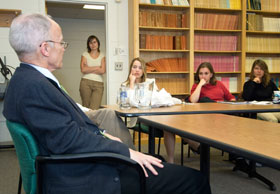  |
| HOME | THIS ISSUE | CALENDAR | GRANTS | BACK ISSUES | < BACK | NEXT > |
Nobel Prize-winner addresses economics grad studentsby Cindy Weiss - October 31, 2005
|
||||
|
Nobel Prize-winning economist Finn E. Kydland advised economics graduate students to take plenty of math courses, find a mentor, and “get your hands dirty on a research paper early on,” when he visited UConn recently. Kydland, co-winner of the 2004 Nobel Prize in economics, told the graduate students to find a clear focus on an interesting question in their research – one that grabs the attention of a reader and tries to solve an anomaly or puzzle. “There’s nothing more boring than a paper that’s not clear where you’re coming from and that kind of rambles on,” he said. Kydland was invited to UConn by the Association of Graduate Economics Students to discuss what makes a good researcher. He expanded on his topic during a seminar and in informal meetings with the students over two days. The graduate students approached Kydland through one of his former Ph.D. advisees, Christian Zimmermann, now an associate professor of economics at UConn, who attended graduate school at Carnegie Mellon University in the early 1990s. “Christian made contact with him, but the students worked very hard to pull this all together,” said Dennis Heffley, professor and department head. Kydland was the first speaker in the students’ Distinguished Speaker Series. In scheduling a Nobel Prize-winning speaker, the students met their goal to “shoot for the highest,” said Rimvydas Baltaduonis, president of the association. The day Kydland won the Nobel Prize he was in Norway, his native country. His picture was splashed across the front page of every newspaper there, so he picked up four or five papers at a newsstand, along with a phone card, and tried to pay with a credit card, he said. The cashier asked him, “Do you have any ID?” he recalled. Kydland says he has learned to say “no” to a flurry of speaking offers since he won the prize, but has agreed to several requests from his former students. His path to the Nobel Prize began in Norway where, he said, he was “lucky in the sense that I had a great high school education and learned as much math as many college students.” He was uncertain what to do with his life after college, so he took a year off to teach elementary school. He became interested in business and applied to the Norwegian College of Economics and Business Administration, but was rejected because he did not have a business education background.
He took the required courses, was accepted, and today is on the faculty there, and also at the University of California at Santa Barbara. Until 2004, he taught at Carnegie Mellon University. “I could have done something much more boring with my life, and I shudder to think of that,” he said. He won the Nobel, with Edward Prescott of Arizona State University, for work that analyzes the design of economic policy and the driving forces behind business cycles. He told the students that writing a research paper early will show them that writing well requires practice, and it will provide the challenge of “finding a professor who will work with you.” “Take as much math as you can – including up to advanced calculus, statistical analysis, and probability theory,” Kydland advised. The Association of Graduate Economics Students has become more active in recent years, Baltaduonis said. It sponsors “snack and chat” hours before weekly seminars, in which students can share their research, and a “Life after UConn” speaker series that invites alumni back to share their career experiences. Many of the 60 or so economics graduate students are from foreign countries: Baltaduonis is Lithuanian, and among those meeting with Kydland in one seminar were students from Lithuania, Russia, Turkey, and Spain. One of last year’s Ph.D. graduates, now an assistant professor at the University of Pretoria in South Africa, will return to speak to the graduate students soon. Of the 200 or so students who have graduated from UConn with Ph.D.s in economics since the mid 1960s, some have served as faculty or academic administrators in various colleges and universities and others have held positions in such major financial institutions as the World Bank, the Bank of England, Lloyds of London, and the Asian Development Bank, said Heffley. Others have gone on to successful research careers in industry, economic consulting, or government. One of the program’s graduates, Tansu Ciller, served as Turkey’s first female prime minister in the 1990s. |
| ADVANCE HOME UCONN HOME |

